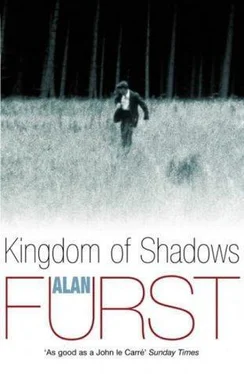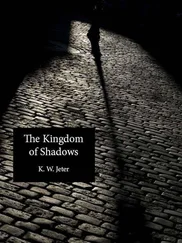Alan Furst - Kingdom of Shadows
Здесь есть возможность читать онлайн «Alan Furst - Kingdom of Shadows» весь текст электронной книги совершенно бесплатно (целиком полную версию без сокращений). В некоторых случаях можно слушать аудио, скачать через торрент в формате fb2 и присутствует краткое содержание. Жанр: Шпионский детектив, на английском языке. Описание произведения, (предисловие) а так же отзывы посетителей доступны на портале библиотеки ЛибКат.
- Название:Kingdom of Shadows
- Автор:
- Жанр:
- Год:неизвестен
- ISBN:нет данных
- Рейтинг книги:5 / 5. Голосов: 1
-
Избранное:Добавить в избранное
- Отзывы:
-
Ваша оценка:
- 100
- 1
- 2
- 3
- 4
- 5
Kingdom of Shadows: краткое содержание, описание и аннотация
Предлагаем к чтению аннотацию, описание, краткое содержание или предисловие (зависит от того, что написал сам автор книги «Kingdom of Shadows»). Если вы не нашли необходимую информацию о книге — напишите в комментариях, мы постараемся отыскать её.
Kingdom of Shadows — читать онлайн бесплатно полную книгу (весь текст) целиком
Ниже представлен текст книги, разбитый по страницам. Система сохранения места последней прочитанной страницы, позволяет с удобством читать онлайн бесплатно книгу «Kingdom of Shadows», без необходимости каждый раз заново искать на чём Вы остановились. Поставьте закладку, и сможете в любой момент перейти на страницу, на которой закончили чтение.
Интервал:
Закладка:
When he got back to the avenue Bourdonnais, he discovered there’d been a blizzard of underwear and shoes and crinkly pink paper. On the kitchen table was a vase with a dozen yellow roses. “These are not from you, Nicky, are they?”
“No.”
“I didn’t think so.”
“Is there a card?”
“Yes, but it’s in Hungarian. I can’t read it.”
Morath could read it. A single word written in black ink on a florist’s card. Regrets.
Three-thirty when Cara’s phone rang and a man’s voice asked him, very politely, if it would be altogether too much trouble to walk to the newspaper kiosk by the Pont D’Alma Metro.
“I’m going to get the paper,” he said to Cara.
“What? Now? For God’s sake, Nicky, I-”
“Back in a minute.”
Dr. Lapp was in a black Mercedes. His suit was blue, his bow tie green, his face as sad as Buster Keaton’s. There was really nothing to discuss, he said.
This was a privilege, not a sacrifice.
Still, Morath felt terrible. Perhaps if he’d been able to say something, to explain, maybe it wouldn’t have been so bad.
“Messieurs et mesdames.”
The conductor had opened the door of the compartment and the rhythmic hammering of the wheels on the track grew suddenly louder. Morath rested the Freya Stark book on his knee.
The conductor held the first-class passenger list in his hand. “ ‘Sieurs et ‘dames, the dining car will open in thirty minutes, you may reserve for the first or second seating.”
He went around the compartment: businessman, middle-aged woman, mother and little boy-possibly English, then Morath. “Second, please,” Morath said.
“And that would be?”
“Monsieur Morath.”
“Very good, sir.”
“Can you tell me, what time we expect to be in Prague?”
“The timetable says four-thirty, monsieur, but, of course, these days …”
2 August 1938. Marienbad, Czechoslovakia.
Six-twenty in the evening, Morath came down the marble staircase and walked across the lobby. Grand hotels in spa towns were all of a type and the Europa was no different-miles of corridors, chandeliers, everywhere mahogany. Frayed carpets, frayed respectability, the former much rewoven, the latter a faint but detectable presence in the air, like the smell of the kitchen.
Two women in leather chairs smiled at him, widow and unmarried daughter, he guessed, come husband-hunting in Marienbad. Morath had been at the Europa for only a night and a day and they had flirted with him twice. They were handsome and well fleshed. Good appetites, he thought, of all sorts. Not unusual in that part of the world. The Czechs felt life owed them a little pleasure; they happily embraced the Protestant virtues but just as happily embraced each other. If a proposal of marriage was not forthcoming then, mother or daughter, rolling around in a creaky hotel bed might not be the worst thing in the world.
Morath walked out the entrance, into a genteel lane lit with gas lamps. There were mountains in the distance, dark shapes in the failing light. He walked for a long time, glancing at his watch every few minutes. He had once, dragged off to Evian-les-Bains by Cara’s predecessor, actually tried the treatment-packed in mud by laughing girls, then hosed down by a stern woman wearing a hair net. Victorian medicine. Victorian eroticism? Victorian something.
He reached the edge of the town, a black, dense forest of pine rolling up a hillside above the street. Down below, the gas lamps twinkled. There were several orchestras at work and he could hear, when the wind was right, the violins. It was very romantic. Through the trees, a glimpse of the toy train that puffed its way up the mountain to the station called Marianske Lazne. Marienbad, in the Austro-Hungarian days. Hard to think of it any other way. The wind shifted, the distant violins floated up to him. Along with a faint smell of gunnery.
Now it was 7:10. There were candles on the tables of the tearoom in Otava Street. Morath studied the menu, mounted in a brass frame on a stand by the door. Inside, a Czech army officer watched him for a moment, then rose from his chair, leaving an uneaten pastry on his plate. To get to his feet, the officer used a stick, a good one, Morath saw, with a brass tip and an ivory head. He was not far from Morath’s age, with a soldier’s face and a neatly trimmed beard, blond and gray and red.
They shook hands in the street. “Colonel Novotny,” the officer said, with a motion of the head somewhere between a nod and a bow.
“Morath.”
An exchange of pleasantries. We are like, Morath thought, two provincial officials, meeting in the sleepy days of the old empire.
Novotny had a military car: the least expensive Opel, something like a Parisian taxicab, painted olive green. “We are going up toward Kreslice,” he said. “About forty kilometers from here.”
Morath opened the passenger door. On the seat was a holstered automatic pistol in a leather belt. “Oh, just put that on the floor,” Novotny said. “We’re in the Sudetenland here-it’s wiser to have something in the car.”
They drove on mountain roads, darker as they climbed, the beams of the headlights alive with moths. Novotny squinted through the windshield, the narrow dirt path twisted and turned and disappeared into the night. Twice they had to put branches under the wheels, and when they crossed bridges over mountain streams-built for wagons and oxen-Morath got out and walked ahead of the car with a flashlight. They passed one house only, a woodcutter’s hut. Up on the crest, something ran away from them; they could hear it, crashing through the underbrush.
“I brought my dog along once,” Novotny said, “coming up here. She went crazy. Ran around and around the car, scratching the windows with her paws.”
“What do you have?”
“Pointer bitch.”
“I’ve had them-couldn’t wait to go to work.”
“That’s her. She was crying because I wouldn’t let her out of the car. I’ve seen bear up here, and stag. Wild boar. The peasants say there’s lynx-kills their animals.”
Novotny slowed to a crawl, worked the car carefully around a hairpin curve. Morath could hear a stream a long way below them. “A shame, really,” Novotny said. “When we start fighting here, well, you know what happens to the game.”
“I know. I was in the Carpathians, in ‘15.”
“This is, of course, where we want them.”
“In the mountains.”
“Yes. We watched them mobilize, back in May. Very educational. Tanks, trucks, cars, motorcycles. Big gasoline tankers. It’s not a secret, what they mean to do-read Guderian’s book, and Rommel’s. Everything’s motorized, that’s the sharp edge of the ax. After the first wave, of course, it’s all horses and artillery limbers, like everyone else. So, the logic goes, run them up the mountains, or make them go through the valleys.”
“Enfilade.”
“Yes. With registered mortars. And machine guns on the hillsides.”
“When will it start?”
“In the fall. We hold them two months, it starts to snow.” Up ahead, the road was cut into wagon ruts. Then it grew steeper, and Novotny shifted into a whining first gear. “What did you do, last time?”
“Hussars. The Sixteenth Corps, in the Second Army.”
“Magyar.”
“Yes, that’s right.”
“I was in the Seventh. First under Pflanzer, then Baltin.”
“Down in Moldavia.”
“To start with. Eventually-I’m an artillery officer-they sent me up to Russian Poland. Lemberg and Przemysl.”
“The forts.”
“Twenty-eight months,” Novotny said. “Lost them, got them back.”
Morath had never fought alongside the Czechs. The Austrian army spoke ten languages-Czech, Slovak, Croatian, Serbian, Slovene, Ruthenian, Polish, Italian, Hungarian, and German-and was normally divided into regiments based on nationality. But the history of the soldiers who defended the forts was well known. Twice they’d been surrounded and cut off, but the hundred and fifty thousand men in the blockhouses and bunkers had held out for months, while Russian dead piled up beneath their guns.
Читать дальшеИнтервал:
Закладка:
Похожие книги на «Kingdom of Shadows»
Представляем Вашему вниманию похожие книги на «Kingdom of Shadows» списком для выбора. Мы отобрали схожую по названию и смыслу литературу в надежде предоставить читателям больше вариантов отыскать новые, интересные, ещё непрочитанные произведения.
Обсуждение, отзывы о книге «Kingdom of Shadows» и просто собственные мнения читателей. Оставьте ваши комментарии, напишите, что Вы думаете о произведении, его смысле или главных героях. Укажите что конкретно понравилось, а что нет, и почему Вы так считаете.












